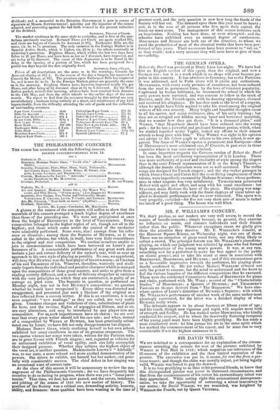EIGHTH CONCERT—MONDAY JUNE 14.
ACT 5.
Sinfonia in D BEETHOVEN. Romance, Madame Doors Gus, " Va dit elle." (Rama le Diable) MENERBEER. Septette, Pianoforte, Flute, Oboe, Horn, Viola, Violoncello, and Contra Basso, Messrs. LISZT, RIMS, H. COOKE, JAR- RETT, Loom LINDLEY, and Daaaoatrrt Cantata, Mademoiselle LOME, " Adelaide," accompanied on the Pianoforte by Mr. MuSCHELES BEETHOVEN. Overture, Preischute C. M. VON WEBER.
ACr u.
Sinfonia, No. 8 Air and Quatunr, Madame Donna GRAS, the Misses Wit" Malls, and Miss DOLBY. " 0 beau pass," (Les linguends) MEyERBEER. Quintetto, Two Violins, Two Violas andVioloncello, Messrs.
VIEUXTESIPS, F. CRAMER. LOSER, T. 0001LE, and LINDLEY. BEETHOVEN. Air,,Ar. PHILLIPS, " your forth uo more," (Jephthe) HANnet,. Overture, Tamerlane Leader, Mr. LODES—Conductor, Mr. MOSCHELES.
A glance at the names of the composers will suffice to show that the materials of this concert averaged a much higher degree of excellence than those of the preceding one. We were not precipitated at once from the height of BEETHOVEN to the level of VIEUXTEMPS. Every composition belonged to the higher region of art, though not all to the highest ; and those which came under the control of the conductor were admirably performed. Some were, alas ! exempt from his influ- ence or direction ; among them the Septetto of HUMMEL, as it was called in the scheme, but which, in truth, bore very little resemblance to the original and real composition. We confess ourselves unable to join in commendations which have been bestowed on LISZT'S per- formance of it. A commendable performance of any great work must include a just and correct delivery of the author's text, with as near an approach to his own style of playing as possible. No one, we apprehend, will deny that Hymnal, was the best player of his own music ; as CRAMER of his and THALBERG of his. Whoever, therefore, wantonly and studi- ously departs from the individual and peculiar character which is stamped upon the compositions of those great masters, and seeks to give them a reading entirely different, and a mode of delivery altogether at variance with the very principles on which they are constructed, is guilty of an outrage on good taste. The Septetto in question, as performed on Monday night, was not in fact HUMMEL'S composition : we question whether he would have recognized it. Every thing was distorted and exaggerated, and presented just such a likeness of the original as a face reflected from a convex mirror. If this is an excellence, it is one soon acquired " new readings," as they are called, are very easily given. Constant changes and violations of time, substitutions of piano for forte, and the reverse, flights of arpeggios ad libitum, and so on, are easy alterations, and may be introduced by any player into any composition. For uusuch impertinences have no charm : we are con- tent that every great writer should tell his own tale ; and when, instead of a composition by WEBER or Hummui., has been practically substi- tuted one by LISZT, we have felt not only disappointment but disgust. Madame Manus GaAs, wisely confining herself to her own school, exhibited her usual excellence as one of its greatest ornaments. The two operas whence her songs were taken, written for the Parisian taste, are in great favour with French singers ; and, regarded as vehicles for an unlicensed exhibition of vocal agility, such airs fully accomplish their designed purpose. Whether they achieve the highest object of the vocal art, is another question. Mademoiselle LOEWE'S " Adelaide " was, to our taste, a more refined and more exalted demonstration of its powers. She Strove to exhibit, not herself but her author, and gene- rally with considerable success. The chief defect in her singing was an occasional want of correct tune.
At the close of this season it will be unnecessary to review the ma- nagement of the Philharmonic Concerts ; for we have frequently had occasion to do so during its progress, when there was yet a " locus preni- tentire." That time, we fear, has now passed, and the errors, indolence, and jobbing of the season of 1841 are now matter of history. The position of the Society was a critical one, demanding activity, honesty, ability, and firmness: these qualities have been wanting in the time of
greatest need, and the only question is now how long the funds of the Society will last out. The demand upon them this year must be heavy ; and, as in the case of all persons who live upon their capital, the break-up must come. The management of this season indicates such an impression. Nothing has been done, or even attempted ; and the schemes have exhibited even an unusual degree of carelessness. MOSCHELES and BISHOP are both out of the direction, to whom we owed the production of most of the classical works that have been per- formed of late years. Their successors have been content to " rub on " as they could ; and a sorry account they will soon have to give of their stewardship.


























 Previous page
Previous page